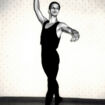The trailer gives a first impression of Abendliche Tänze.
PROJECTS
> DOCUMENTATION 2013
The project documentation gives an insight into the rehearsal work for Abendliche Tänze and explains Winkler’s idea and concept for the work.
Christoph Winkler:
Abendliche Tänze
“The dance piece has its time, no different to the dancer himself who is caught in the timeframe that allows him to use his body confidently as an instrument. That is fate in dance.” Mary Wigman
Using memory as an attempt to see the world in a new way: Abendliche Tänze (Evening Dances) is both the name of a 1924 choreography by the legendary expressionist dancer Mary Wigman, and the title of a 1979 ballet by Tom Schilling. While Wigman’s work emerged in the context of the Weimar Republic, Schilling was part of the GDR political system and founded the dance theatre at Berlin’s Komische Oper. He even danced with Wigman as a young man but knew nothing about her work with the same name.
Christoph Winkler’s version of Abendliche Tänze was neither a third new dance piece with the same name, nor was it a remake or reconstruction. Instead, the choreographer looked at a specific form of memory located in choreographic practice itself.
The use of historical concatenations in Winkler’s work posed many questions regarding dance as an art form. The piece took a critical look at his own dance tradition, as well as how history is understood in dance today, and made it clear that references and developments do not follow a linear path.
Winkler also created autobiographical references. Coming from a small town near Leipzig, he looked back on his own youth, the GDR, weight training, ballet training, conflicts and techno, and repeatedly on his numerous encounters with Wigman’s and Schilling’s works. Working with seven dancers and actors, the result was a subjective, remembrance choreography that sought to reflect on the history of German dance beyond reconstruction.
The full performance can be viewed at www.christoph-winkler.com
Concept – Christoph Winkler
By and with – Chris Daftsios, Emma Daniel, Karima El Amrani, Karolina Kraczkowska, Pietro Pireddu, Claire Vivianne Sobottke and Ahmed Soura
Creative consultant – Mirko Winkel
Music – Tian Rotteveel
Costumes – Lisa Kentner
Costume support – Marlene Modéer
Lighting and technology – André Schulz
Production dramaturgy – ehrliche arbeit – freies Kulturbüro
Assistant – Franziska Ruhnau
Music – Franz Schubert Piano Trio in E-flat major, Notturno – Hansheinz Schneeberger, Jörg Ewald Dähler and Thomas Demenga
Music, vocal arrangements, piano – Tian Rotteveel
(Ständchen and Der Tod und das Mädchen)
Other music – Holly Herndon
A production by Christoph Winkler and ehrliche arbeit – freies Kulturbüro. In partnership with the Sophiensaele performing arts theatre, Berlin. Funded by TANZFONDS ERBE – an initiative of the Kulturstiftung des Bundes and theGoverning Mayor of Berlin – Senate Chancellery – Cultural Affairs. With support in kind from Phase 7.
- 8 May 2014 | Sophiensaele, Berlin – premiere
- 9-11 May 2014 | Sophiensaele, Berlin
